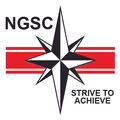
PRINCIPAL'S REPORT
Key Dates
09 May Year 7 Immunisations
14 to 16 May NAPLAN Testing
3 to 7 June Year 7 - 10 Exams
10 June Queen's Birthday
(Public Holiday)
11, 13 & 14 June Year 11 & 12 Exams
12 June GAT - Unit 4 Students
14 June Assessment & Reporting Day
(Student Free Day)
17 June Semester 2 commences
28 June Last day Term 2
(1:30 pm finish)
Mr Nicholas Adamou
Principal
Geelong Schools’ 85th Annual ANZAC SERVICE Commemoration
(Memorial Foyer, Johnstone Park, Geelong)
On Tuesday, 24 April at 11.00 am, I had the pleasure to accompany School Captains Bailey Kitchen and Beth Cook at the Geelong Schools’ 85th Annual ANZAC commemoration.
The service took place at the Memorial Foyer, Johnstone Park in Geelong. Each year primary and secondary school students from Geelong and Bellarine peninsula come together to remember those who lost their lives through war to enable us to live in a free and democratic country today.
Our School Captains Beth and Bailey, placed the NGSC wreath in memory of the fallen soldiers. In addition, they were present for speeches highlighting the brave acts of the ANZACs.
Lest We Forget.
Capital Works and Refurbishment
The 4.75 million dollar capital works project is progressing satisfactorily and is within the scheduled timeline. Stage One (B Block; Food Technology Area), Stage Two (North of C Wing and courtyard in between B and C Blocks), Stage Three (Science wing, North of C wing new Toilet Block and under cover decking) and Stage Four (car park) have been completed and delivered back to the school. The school community is very happy to work in both the refurbished facilities and the new facilities. Students I talk to, out in the yard, fully appreciate the modern teaching and outdoor spaces.
All new or refurbished teaching spaces are fully air-conditioned and they all include the latest ‘touch screen’ ICT technology, ensuring that our broad curriculum and extra-curriculum programs are complimented with the resources and cutting edge ICT technology.
The final stage South of C wing currently under construction is a brand new larger common staff room, a larger new Conference Room, a refurbished Year 12 Common Room and a fully refurbished Careers Room. These works are expected to be completed by early July. We can now truly say that we can see the light at the end of the tunnel with the school capital works.
2019 NAPLAN Testing
On Tuesday 14, Wednesday 15 and Thursday 16 May, our Year 7 and 9 students will undertake this year’s NAPLAN tests.
The National Assessment Program – Literacy and Numeracy (NAPLAN) is an annual assessment for students in Years 3, 5, 7 and 9. It has been an annual event for schools since 2008. All students in these year levels are expected to participate in tests in Reading, Writing, Language Conventions (spelling, grammar and punctuation) and Numeracy. All government and non-government education authorities have contributed to the development of NAPLAN materials
Why do students do NAPLAN tests?
NAPLAN is the measure through which governments, education authorities, schools, teachers and parents can determine whether or not young Australians are meeting important educational outcomes in literacy and numeracy. The tests provide parents and schools with an understanding of how individual students are performing at the time of the tests. They also provide schools, states and territories with information about how education programs are working and which areas need to be prioritised for improvement.
NAPLAN tests are one aspect of the school’s assessment and reporting process and do not replace the extensive, ongoing assessments made by teachers about each North Geelong Secondary College student’s performance.
What will be tested, and how?
NAPLAN tests the sorts of skills that are essential for every child to progress through school and life, such as reading, writing, spelling, grammar and numeracy. The content of each test is informed by the National Statements of Learning for English and Mathematics which underpin state and territory learning frameworks. Questions are multiple-choice or require a short written response.
Who will run the tests?
NAPLAN tests are conducted at schools and administered by classroom teachers, school deputies or the Principal.
How can I help my child prepare for the tests?
NAPLAN assesses literacy and numeracy skills that students are already learning through the school curriculum. Teachers will ensure students are familiar with the test formats and will provide appropriate support and guidance. If you have any questions about your child’s preparation for NAPLAN, you should make a time to speak with their teacher.
The best way you can help your child prepare for NAPLAN is to reassure your child that NAPLAN tests are just one part of their school program, and to urge them to simply do the best they can on the day. The use of services by coaching providers is not recommended.
What additional support can schools provide for students with special needs?
All students are encouraged to participate in NAPLAN tests. Students with disability may qualify for adjustments which reflect the support normally provided in the classroom. Students who have a temporary injury may also be reasonably accommodated.
A formal exemption may be granted for a student with significant intellectual disability and/or significant co-existing conditions, or who has recently arrived in Australia and came from a non-English speaking background.
The school principal and your state testing authority can provide you with more information on special provisions or the process required gaining a formal exemption.
How is NAPLAN performance measured?
NAPLAN is not a pass or fail type test. Individual student performance is shown on a national achievement scale for each test. Each test scale has ten bands and all year levels are reported on the same scale. Six bands are reported for each year level for each test. One of these bands will represent the national minimum standard for students at each year level. A result at the national minimum standard indicates that the student demonstrated the basic literacy and numeracy skills needed to participate fully in that year level. The performance of individual students can be compared to the average performance of all students in Australia.
What happens if my child is absent from school on test days?
Wherever possible, schools will organise for individual students who are absent at the time of testing to complete missed tests at another time during testing week.
Will I receive a report on my child’s performance?
A NAPLAN report will be issued by your school later in the year. The same report format is used for every student in Australia. The school will notify you when the reports are being sent home. If you do not receive a report, you should contact the school. Individual student results are strictly confidential.
How are NAPLAN test results used?
- Schools use results to identify strengths and weaknesses in teaching programs and to set goals in literacy and numeracy.
- School systems use results to review programs and support offered to schools.
- Students and parents may use individual results to discuss progress with teachers.
- Teachers use results to help them better identify students who require greater challenges or additional support.
- The community can see average school NAPLAN results on the My School website.
Where can I get more information?
For more information about NAPLAN:
- visit www.nap.edu.au
- contact your child’s school
- contact your state or territory’s education authority (details available on the NAP website)
WHY CHOOSE A PUBLIC SCHOOL?
At this time of the year families are making important decisions about choosing a secondary school for their child.
There’s a common misleading view that if you send your child to a private school, your child will get better results.
But the facts show that this is wrong.
A recent review of almost 30 academic studies revealed public schools achieve similar student outcomes to Catholic and Independent schools across a range of education indicators. (Cobbold, 2015)
The review showed there were no significant differences between the results of students from public, Catholic and Independent schools in national and international tests and also in university completion rates.
According to the review, first year of university students from public schools outperform other students – they achieve higher grades in their first year of university than students from Catholic and Independent schools.
For more information about the review’s findings please go to the following website: http://www.saveourschools.com.au/public-education/studies-show-public-schools-achieve-similar-results-to-private-schools.
As a leader in the public school system I believe it’s important that families know about this information because it can help inform their decision-making.
Public schools are just as good as private schools in the area that matters most – developing your child’s potential. The review is one of many pieces of educational research showing that students from the same social background do as well in public schools as they do in Catholic or Independent schools.
There are other good reasons to consider enrolling your child in a public school. They include the following:
- Public schools are great value for money compared with private schools, which charge families up to $30,000 each year in tuition fees per child. Tuition at public schools is free, with families paying only for books and some essential items.
- Children in public schools learn to get on with a wide mixture of students from different backgrounds. These advanced social skills – cooperation, empathy, problem solving, understanding – are increasingly prized in the modern workplace. They equip students for success in life and in their future work.
- Public schools are neighbourhood schools. Enrolling your child in a school within walking or riding distance to home makes it easier for you to know who your child’s friends are, to make friends with other local parents and to forge closer links with your school and your community.
- High quality teaching is one of the biggest factors that influence student learning. That’s why public schools are intensifying their efforts to enhance the skills of their teachers through mentoring, peer and student feedback and other forms of professional development.
Public schools are the backbone of our nation’s education system. They express our Australian egalitarian values. They provide opportunities for all children to succeed, no matter where they live. They give all children a fair chance to reach their potential and lead a fulfilling life.
As Principal of a public school for a number of years, I am extremely honoured and proud of my current and previous school communities. I am also proud of the outstanding achievements of public school students over the years.
I encourage parents/guardians to book a tour with our Transitions Leader Ms Astles or a Principal Class Officer to visit the school to see it in operation. Matching your child’s needs with the right high school is crucial to your child’s future success not just at school, but also in their future pathway.



